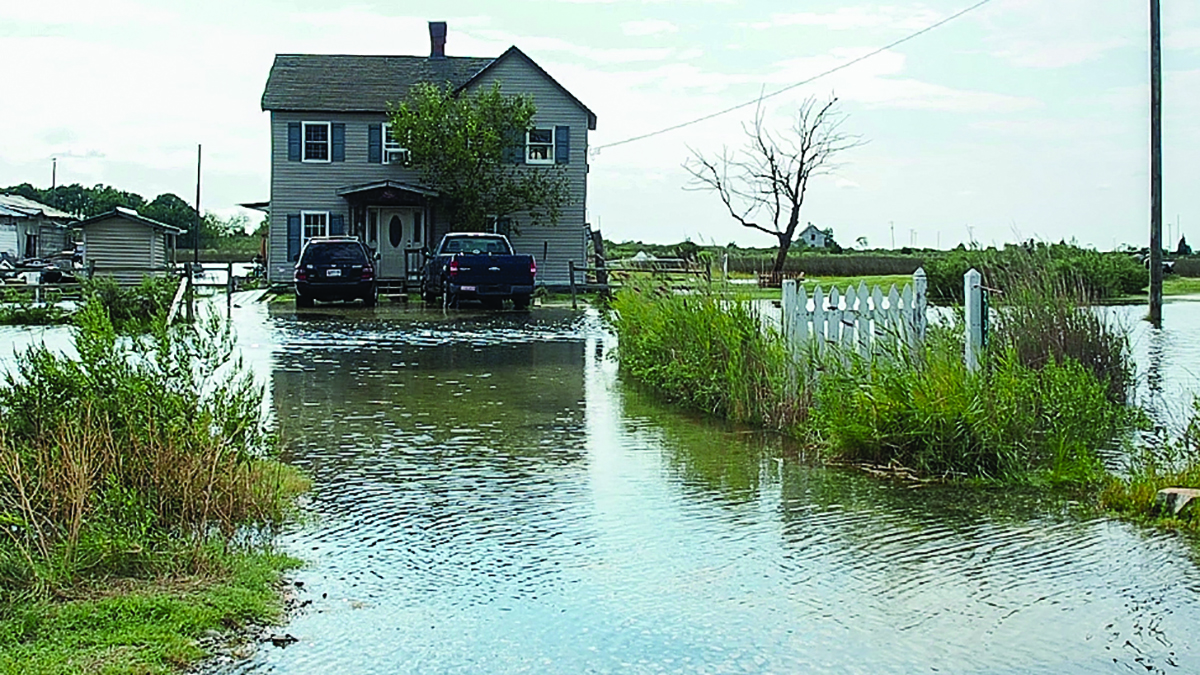Always, I've assumed knowledge equals power. If you do the science that makes sense of a mysterious world, it enables you to comprehend your problems and you'll eventually solve them.
I've seen it work here on the Chesapeake Bay to restore rockfish, stabilize blue crabs, improve water quality and make the case for protecting oyster reefs and wetlands.
The progress is always messy, involving politics and economics, and never as clean or straightforward as the underlying science. But, warts and all, it's progress.
Knowledge equals power. It has sustained me through some dark environmental times. But what if it's not always true, or is no longer? What if knowledge turns out to have no sway over the two overarching environmental crises of our time—climate change and the exhaustion of natural resources—both of which will erode hopes for a saved Bay?
I'll start with climate change, the subject of a discussion-provoking, 49-page work of fiction that we give our Environmental Studies students at the university where I teach. I hope it's fiction, anyway, because it's called The Collapse of Western Civilization, authored in 2014 by highly regarded science historians, Naomi Oreskes and Erik M. Conway.
It's a tale told by a Chinese historian in the late 24th century who is trying to understand how the world could have let it happen. Great civilizations, he knows, have risen and collapsed for millennia, from the Byzantine to the Mayan and Roman.
But this collapse, which unfolded through 2093, was unlike any other, because we had the knowledge to prevent it. The horrific potential of runaway climate change was long and accurately predicted, the causes well documented, along with solutions. And yet we were powerless to stop it.
China came out relatively well. (Collapse, you'll be heartened to know, is not extinction; merely mammoth suffering and dying and centuries of clawing back to civilization.) The heavy-handed, centralized Chinese style of government proved most capable of ameliorating the impacts of climate change (quickly relocating 250 million people as seas rose 25 feet); the Chinese were also best able to quell social turbulence as famine, disease and calamitous weather became the new normal.
This is ironic, the authors say, because it was arguably the opposite style of government—the hypercapitalist, free-market-worshipping regimes—that proved most vulnerable to denial of climate change, to letting the corporate titans of the "carbon combustion complex" discredit science.
These countries conflated unfettered economic growth with personal liberties. They abhorred limits, and climate change mitigation seemed a giant limit to economic expansion and therefore, freedom.
But as the crises grew, it demanded more and more of the reviled limits—rationing, one child per couple, forced relocation and martial law.
The Collapse of Western Civilization is only partly a critique of unregulated capitalism. Its authors are experts on the history of science, and they offer insight as to how Western science also let its knowledge be overpowered by a free-market ideology and too much faith in technological solutions.
The scientists had become too "siloed," too reductionist to be skilled at the systems analysis that sees broader patterns. Under pressure from well-funded doubt mongers, climate scientists became ultra cautious in sounding alarms until it was too late, insisting on "scientific rigor" in the extreme to put off controversial conclusions.
Its title notwithstanding, Collapse is a lively read, invoking satire like the enactment of "sea level rise denial" legislation as well as exploring why it's so easy to "sell" doubt.
And while one can take comfort that it's only fiction—at least for a little while longer—Oreskes and Conway recall an earlier work that sadly is not fiction and which questions even more profoundly whether knowledge is power: Limits to Growth, published in 1972 and updated in 1992 and 2004.
The team of scientists who penned that seminal book coined the term "overshoot": humans living unsustainably, beyond the resources of the Earth to accommodate them. Even more directly than climate change, the book challenged the "grow or die" ideology that permeates every aspect of most nations' economic policies.
In the decades after Limits was published, it was often dismissed as having predicted a disaster that never happened. Indeed, it didn't happen in those few decades, and the authors never said it would. In their worst-case scenario, our unsustainable ways wouldn't begin to degrade prosperity until 2015. More likely, it wouldn't begin until much later in the 21st century.
Despite decades of science amply documenting the unsustainability of humanity's consumption and population growth, "we failed totally to get the concept of 'overshoot' accepted as a legitimate concern for public debate," wrote Dennis Meadows, one of the book's authors, in the 2004 update.
I called Meadows a few years ago, hoping he'd speak at a Bay Journal conference examining the impact of growth on the Chesapeake Bay. He politely declined. He no longer felt it was worth working on anything but the local environment where he was retired.
The global population was 4 billion when Limits was first published. It's close to double that now, yet scarcely a single environmental group, let alone our political leaders, wants to talk about it.
And, wouldn't ya know, population increase is also well-documented as a major driver of greenhouse gases, like CO2, that cause climate change.
I still have faith in science, because what else would I advocate—"unscience"? But I have less faith in science's ability to win the day absent profound changes in our economic ideology of endless growth.
Tom Horton has written about Chesapeake Bay for more than 40 years, including eight books. He lives in Salisbury, Md., where he is also a professor of Environmental Studies at Salisbury University. His views do not necessarily reflect those of the Bay Journal.
Ignoring Science Won't Make Looming Climate Calamity Go Away

Increasingly frequent tidal flooding comes to the doorstep of a home on low-lying Hoopers Island, Md., on the eastern shore of the Chesapeake Bay. (Bay Journal photo by Dave Harp)


